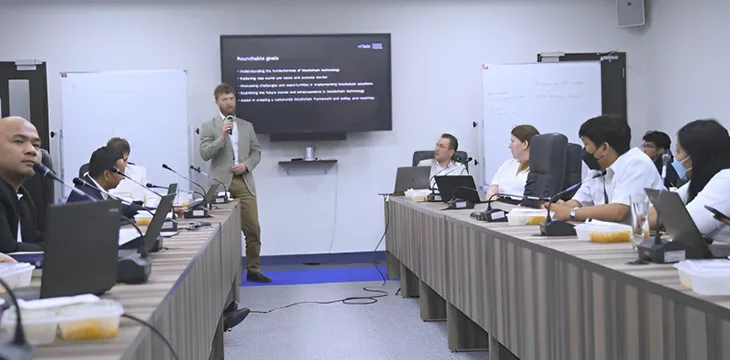|
Getting your Trinity Audio player ready...
|
nChain, a prominent global provider of blockchain technology, intellectual property licensing, and consultancy services, recently made significant strides in the Philippines during the period of August 7-11. The company extended its expertise and support to key government agencies, including the Department of Science and Technology (DOST), the Department of Information, Communications and Technology (DICT), the Bangko Sentral ng Pilipinas (BSP), and the Securities and Exchange Commission (SEC). This initiative aimed to share nChain’s blockchain knowledge and insights.
Stephanie Tower, the Business Development Lead at nChain Philippines, described their mission, saying, “We just launched the Blockchain Immersion Program in the Philippines. Our goal is to create a platform where people can immerse into blockchain tech through various activities. We are doing roundtable discussions, training, and workshops with government agencies here. And the goal is to really impart our knowledge as a company and how it can help in driving the digitalization of the Philippines.”
The Philippines has been actively exploring the potential of Web3 to enhance its government services. However, the complexities of blockchain technology require specialized expertise. Dr. Owen Vaughan, Chief Science Officer at nChain, emphasized the interest of government agencies in tools like nChain’s Kensei, a data integrity platform. He noted, “Some things I’ve picked up on is that they’re very interested to know any tools we might have that may be useful for them to create their own pilot schemes and proofs of concepts.”
In addition to imparting knowledge about blockchain tools, nChain engaged in dynamic discussions with the BSP. These conversations included a learning exercise on central bank digital currencies (CBDCs). Drawing from nChain’s experiences and global collaborations with various governments, valuable insights were shared with the CBDC group of BSP.
As an integral part of the blockchain immersion program, the BSV Blockchain Association conducted workshops, offering participants a comprehensive understanding of blockchain technology through specialized courses. Evan Freeman, Director of Education at the BSV Blockchain Association, highlighted the significance of these workshops, stating, “What these workshops accomplish is getting everybody on the same level so that they can begin to work together and be successful in these endeavors because this is not just about a particular agency; it’s about ensuring they can collaborate effectively.”
With its profound knowledge and innovative solutions in blockchain technology, nChain has become a valuable partner in helping the Philippines navigate its transformative journey. Dr. Craig Wright expressed optimism, stating, “There are a lot of educated people here in the Philippines, there are many people trained in ICT, and as soon as people start to implement the technology—some of this is going to happen when we start building, then everything will just explode.”
Feedback from participants who attended the roundtable discussions and workshops reflects the positive impact of nChain’s initiatives.
Edwin Paala, IT Officer for Financial Crimes at the DICT’s Cyber Crime Coordinator Center, emphasized the potential of blockchain in addressing financial crime.
“Financial crime is a major concern for the agency… Bitcoin presents a very great opportunity. We are prepared to exploit blockchain,” he noted.
Regarding blockchain’s benefits for government agencies, he stated, “It adds new concepts to information security… there are new things we can bring into place with such new innovation.”
Maria Theresa Cabaraban and Gilbert Yu, Science and Tech Fellows at DOST’s Philippine Council for Industry, Energy, and Emerging Technology Research and Development (PCCIERD), pointed out the need for more blockchain experts in the country. They expressed hope that the blockchain roadmap developed during DOST’s blockchain training in 2022 would increase blockchain developers, users, and consumers of the technology.
Meanwhile, Oliver Chato, ICTD Director at the SEC, underscored the significance of nChain’s workshops for government agency employees. He explained that the event focused on how to use blockchain and introduced blockchain in the context of regulatory functions of government agencies. Chato also mentioned the curriculum offered by the BSV Blockchain Association, which discussed managing risks associated with blockchain and utilizing blockchain for utility purposes.
Chato also highlighted the versatile nature of blockchain technology, stating, “It’s not just part of crypto and finance but also in terms of public governance for the submission of information, documents, for verification of identities, whether in public or permissioned blockchains.”
nChain’s recent work in the Philippines has provided valuable information to government agencies. These events have helped lay the groundwork for a more tech-savvy future, with blockchain contributing to improved government services and innovation. Anticipation runs high for the exciting developments that will unfold as this collaboration continues to impact the Philippines’ digital landscape.
Watch nChain Manila Blockchain Meetup: Preparing the Philippines for blockchain revolution

 03-04-2026
03-04-2026 




